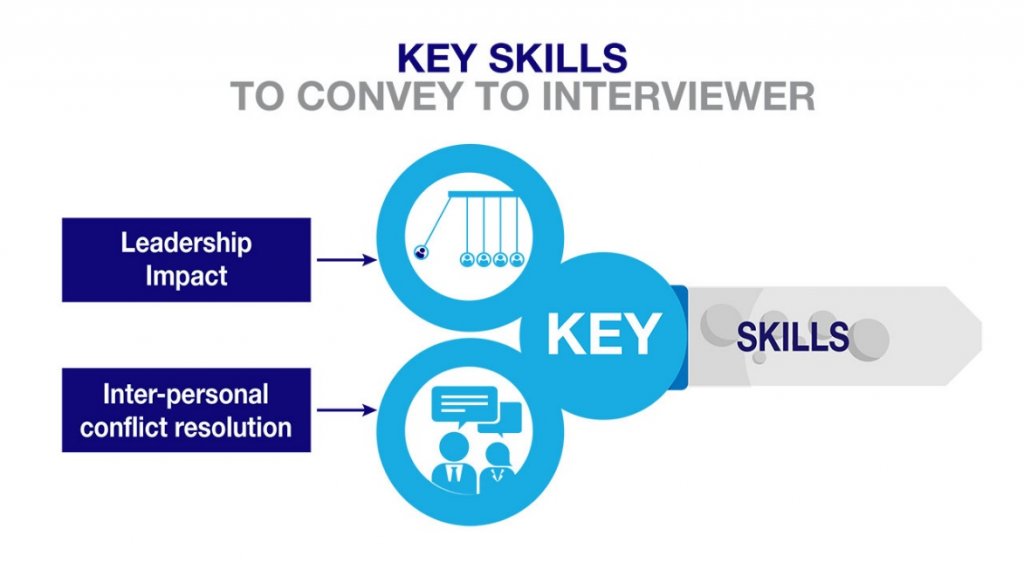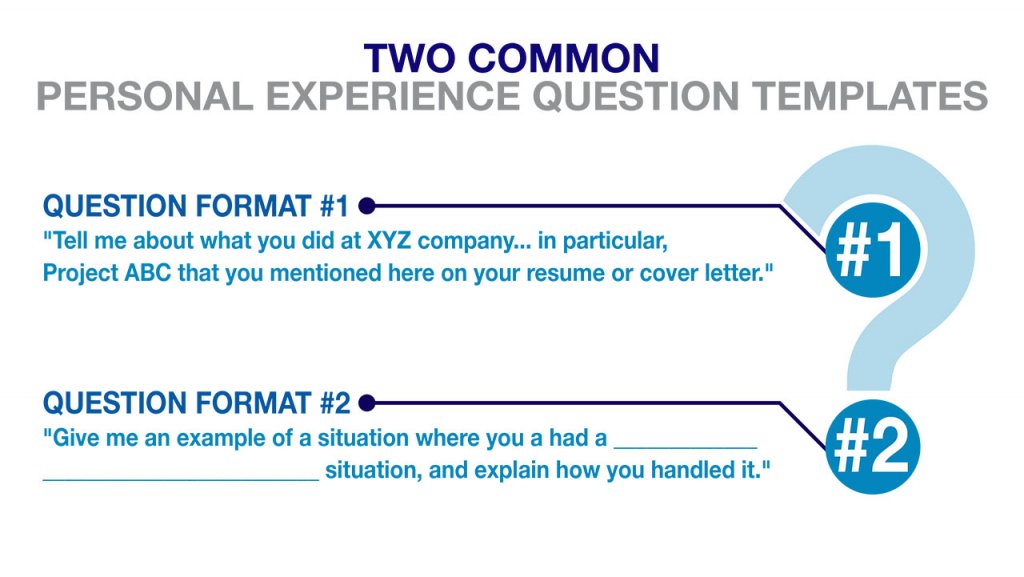At consulting firms like McKinsey, you will receive a personal experience interview (or McKinsey PEI).
Sometimes an entire interview is devoted to these types of questions. Other times, you will receive 10 – 15 minutes of these kinds of questions before you get a case interview.
The format will vary by firm, but make no mistake about it, they will ask you about your personal career experiences.
Despite the emphasis I and others places on the case interview, it is important that you be prepared for the more general interview questions that are based on your consulting resume.
Be sure to allocate some time to prepare your answers for these questions and to practice delivering them.
The important thing to realize is that consulting firm interviewers ask resume-based questions differently than employers from other industries. In particular, the interviewers in management consulting are looking for very specific things in each answer you give to him or her.
It is important you know what it is they are looking for, and that you provide those answers in an efficient way.
It is entirely possible to be a qualified candidate, but to fail to communicate just how qualified you are in the time allotted for the personal experience interview.
So to start, let me explain why interviewers ask these questions, what kinds of case interview questions to expect, and how to answer them.
First, let’s step back for a moment.
Consulting is really the merger of two very different fields — business analysis and interpersonal leadership skills.
One is very logical or “left brained,” the other is very “soft” or “right brained.”
Good consultants are competent at a very advanced level in both disciplines. It is an unusual combination to find in candidates, and that is in part one reason why firms like McKinsey will consider 40,000 applicants (or some ridiculously high number like that), just to hire a few hundred people each year.
The premise of the case interview is to use a business simulation to test your business analysis skills (or general quantitative analysis skills as applied to a business problem).
The rationale is if you can successfully demonstrate these business analysis skills in a simulated client situation, then in a real life client situation you are likely to do the same.
It is the equivalent of making airplane pilots use a flight simulator before they are allowed to fly a $100 million aircraft.
This is why the case interview exists.
However, as I mentioned, business analysis is only one aspect of the consulting role.
The other role is interacting with clients — often under less than ideal circumstances.
Often clients are in state of massive disagreement about what to do next — and you are placed in the middle of it.
It is quite common that junior clients resent or feel threatened by your presence, are reluctant to help you, and don’t feel that compared to their 25 years of industry experience, you have anything useful to contribute… and then there is the second day of work (I’m kidding… but only a little!).
It is very important that you are able to handle yourself well in this kind of situation.
If you don’t, it reflects extremely poorly on your firm. If you offend a junior client, they will tell everyone else at the client company that your firm (not you… your firm) consists of a bunch of arrogant jerks and nobody should work with them.
The premise of the personal experience interview is the idea that “previous track record is a predictor of future performance.”
If dealing with challenging inter-personal situations is something you do all the time, then it stands to reason that the next time you have an inter-personal challenge, you will be able to handle it.
The key thing to keep in mind is that you need to convey to the interviewer two things:
1) LEADERSHIP IMPACT
2) INTER-PERSONAL CONFLICT RESOLUTION
And in particular, the interviewer is looking for a track record of your ability in these two areas.
1) Leadership Impact in its simplest form is to get a bunch of people — who disagree — to agree on one idea enough to actually do it… and do it successfully (this is the impact part).
In the context of consulting, it is not easy.
Imagine working with a group of clients who each have 25 years of experience in the industry. (Keep in mind these are “junior” clients… not based on biological age, but on hierarchy within the organization.)
Since you started working 3 days ago with this client, you have 3 days of experience.
They have been doing business one particular way for the last 25 years.
It turns out this approach no longer works, and a new method needs to be implemented instead. And it is your job to get them to make this change.
GO…
The ability to pull that off is what consulting firms are looking for in terms of leadership.
So any experience you have in any context (previous employers, academia, extra-curricular activities, non-profit organizations) can substantiate your ability to handle this kind of situation.
2) Inter-personal conflict resolution is the ability to operate in deeply political situations.
One of my old professors used to say, “Any time there are two people in a room, there is politics.”
Politics is at its core a situation where two or more people disagree on what to do next, and each will try to influence the other.
If you have four department heads, and four opinions on whether or not the company should proceed in a particular direction, you have politics.
Much of what is political is under the surface.
Executive 1 does not like or does not trust Executive 2. Executive 3 does not want Executive 4 to get too big of a budget, because most likely it will come by shrinking Executive 3’s budget.
If a new consultant has never been in a political situation, can’t read people, doesn’t intuitively know how to handle such a situation, they will get eaten alive by clients.
It is not necessary that the new consultant be familiar with working with business executives. The ability to handle inter-personal conflicts of any type is quite often very transferable to other situations.
To recap, in the personal experience interview, the interviewer is looking for your track record of 1) Leadership Impact, and 2) Inter-Personal Conflict Resolution.
Keep this in mind as we proceed further.
In terms of what questions to expect, there are two common question templates to be aware of. The important thing to realize is that regardless of how the question is asked, the interviewer is looking for the exact same thing — leadership and/or inter-personal conflict resolution.
Question Format #1:
“Tell me about what you did at XYZ company… in particular, Project ABC that you mentioned here on your resume or cover letter.”
(Translation: “It looks like at XYZ company you did Project ABC, which seems like it would be a project where you might have demonstrated leadership skills and/or inter-personal conflict resolution skills; tell me about this project and in particular, provide concrete examples of how you might have demonstrated these two skills.”)
Question Format #2:
“Give me an example of a situation where you a had a ___________________ situation, and explain how you handled it.”
The ________ is usually some variation of a “leadership challenge” such as:
* “group situation where the group was deeply divided”
* “you need to convince a group of people to change their minds and take action different than the one they intended to”
* “a group that was in disarray that needed to get something important done”
* “a group with bad morale that still needed to be effective”
Basically, the model is: “Give me an example of some really screwed up situation involving a lot of people that you successfully resolved.”
I strongly recommend you consider which examples from your background you want to emphasize. Prepare to explain them and even practice explaining them with other people.
Given the interviewer’s intentions are very predictable (even though an individual interviewer’s specific actions may vary), it makes sense to be prepared to address these predictable intentions.
In terms of how to answer these questions, there is a specific format that I recommend that efficiently gives the interviewer all the information she is looking for.
The reason it is important to be efficient is you have only a limited amount of time to communicate your abilities.
If you communicate the best of what you have to offer and you get rejected anyway, there is not much you can do about it. You got beat by the competition.
But, if you communicate only 50% of what you have to offer because you ran out of time, and then you got rejected — in that case, it is your own fault you got rejected — as opposed to being beaten by the merits of the competition.
The method I recommend is something I call the PARADE method which I prefer over the more common STAR Method. It is a specific approach that I developed to help candidates answer personal experience interview questions in consulting firms.
It is also a useful interview answer template for senior level executive jobs that often follow a stint in consulting.
Free Case Interview Prep Program – Sign Up For Free Instant Access to the Largest Collection of FREE Case Interview Training Resources.
This form collects your name and email so that we can add you to our email list that delivers the free resources you are requesting. Check out our privacy policy for details on how we protect and manage your submitted data.
We’ll never spam you or share your email. Unsubscribe at any time.


